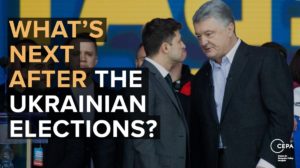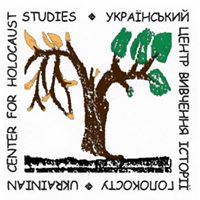
Ukrainian Center for Holocaust Studies
The May 20 inauguration of Volodymyr Zelensky, a newcomer from outside the political establishment who campaigned on a program of bold reform, shows how far Ukraine has come in consolidating democracy since the Maidan revolution in 2014, notes Carl Gershman, president of the National Endowment for Democracy.
The country still faces many formidable challenges, the most urgent being combating poverty and endemic corruption, and defending itself against Russia’s continued armed aggression. But this is a new and hopeful moment for Ukraine, and it may offer an opportunity to address another issue that, though less urgent, is nonetheless profoundly significant for Ukraine’s future: the traumatic legacy of the Nazi Holocaust, he writes for The Washington Post.

CEPA
Moscow “greeted” Zelensky with a double whammy, announcing both the virtual end of Russian hydrocarbon exports to Ukraine, and a policy of facilitating the issuance of Russian passports, ostensibly as a humanitarian gesture, to Ukrainian citizens in the Russian-controlled Donbas, notes analyst Kirk Bennett.
While Russian liberals celebrated the salutary example of Ukrainians unseating an incumbent President in free and fair elections, the Kremlin is probably not overly anxious about any democratic contagion. What, then, might make Moscow apprehensive about a Zelensky presidency? I believe there are two factors in play, he writes for The American Interest:
- First, while democratic elections and the crushing defeat of an incumbent in Ukraine will not by themselves impress many Russians, they point to something potentially highly subversive for the Putin model of governance and for Russian policy in the post-Soviet space…. If Ukraine’s relative freedom became associated in popular Russian thought not with anarchy and arbitrariness but with a modicum of justice and prosperity, the repercussions for Russia could be earth-shaking—or at least regime-shaking. ….
- Second, regardless of the success of Ukrainian reform under Zelensky, the election of a Russophone President will probably prove—once again—to be a bitter disappointment for Moscow, changing at best the tone and the pace but not the overall trajectory of the Russo-Ukrainian “long goodbye.”
Ukraine’s new language law, passed at the end of the former president’s rule, could be instrumentalized in an attempt to divide Ukrainian citizens, says analyst Roman Huba. Indeed, a consolidation of Ukraine’s Russian-speaking electorate in response to this strategy could draw potential votes from Zelensky’s political party towards Opposition Bloc and other political groups that emerged from the Yanukovych-era Party of Regions, he writes for Open Democracy.
“What is interesting is that Zelensky is a part of the populist wave that is sweeping across Europe,” said Michael Khodarkovsky, a historian at Loyola University Chicago. “But in Western Europe, populists are the right-wingers who want to undermine the democratic institutions, while in Eastern Europe, it is the reverse: Populists like Zelensky are fighting for a genuine and free democracy.”

Ukrainian Center for Holocaust Studies
The new government in Ukraine should also play a more expansive role in acknowledging the Holocaust as part of its national history, the NED’s Gershman adds:
An important first step was the recent announcement by the Foreign Ministry that Ukraine intends to join the International Holocaust Remembrance Alliance. The Culture Ministry also should take the gravesites under its active protection and regulate the juridical questions related to land use. This should be done as soon as possible, before the land is offered to private investors. In addition, criminal proceedings should be initiated against those who are destroying gravesites — occurrences which are, unfortunately, not uncommon. RTWT







